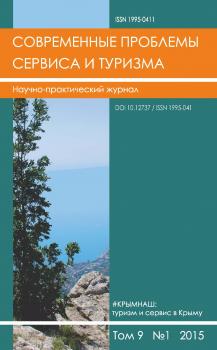Moskva, Moscow, Russian Federation
Moskva, Moscow, Russian Federation
Moskva, Moscow, Russian Federation
The Russian Federation has developed network of different natural protected territories and significant potential for ecotourism development. Ecotourism should be considered as a priority type of tourism for Baikal natural territory. Zabaikalsky National Park is one of the few reserves in Russia, which in its natural settings fully meet the UNESCO criteria. The recreation nature use is developing rapidly in the park in the last ten years. Tourism is often spontaneous. Such development with the lack of organizational events caused several problems associated with the disruption of ecosystems. There is no organized and equipped routes, including ecological routes, where the tourists could explore the landscapes and components of the park. It’s necessary to equip the most popular areas of the park and to develop routes for of different types of tourists to reduce the recreational digression in the most popular tourist places. Any offers of nature protected territories development must correspond to the ecological capacity of natural objects, which depends on a set of parameters. The authors offer several actions to develop ecotourism in one of the most popular area “Monakhovo – Zmeevaya bay” to provide the high level of safety and comfort of eco-routs and to minimize the impact on nature.
recreation, ecotourism, specially protected natural territories, Zabaykalsky National Park, ecological route, recreational digression.
1. Bishop K., Grin M., Fillips A. Modeli nacional'nyh parkov. M.: Izd-vo Centra ohrany dikoy prirody, 2000. 216 s.
2. Efremova M.V. Razvitie rossiyskoy turistskoy industrii v usloviyah krizisa // Marketing v Rossii i za rubezhom. 2010. №.2. URL: http://www.mavriz.ru/articles/2010/2/5314.html. (Data obrascheniya: 02.10.2017).
3. Ivanov A.N., Chizhova V.P. Ohranyaemye prirodnye territorii: Monografiya. M.: YuRAYT, 2017. 183 s.
4. Kazanskaya N.S., Lanina V.V., Marfenin N.N. Rekreacionnye lesa: Monografiya. M.: Lesnaya promyshlennost', 1977. 96 s.
5. Kazanskaya N.S. Izuchenie rekreacionnoy digressii estestvennyh gruppirovok rastitel'nosti// Izv. AN SSSR, ser. geograf. 1972. Vyp. 1. S. 65-72.
6. Kolbovskiy E.Yu. Ekologicheskiy turizm i ekologiya turizma: Monografiya. M.: Izd. centr «Akademiya», 2006. 256 s.
7. Krasovskaya T.M. Prirodopol'zovanie Severa Rossii: Monografiya. M.: LKI, 2008. 272 s.
8. Tropa v garmonii s prirodoy: Sbornik rossiyskogo i zarubezhnogo opyta po sozdaniyu ekologicheskih trop / Red.: N.N. Butorina i dr. M.: R. Valent, 2007. 176 s.
9. Hrabovchenko V.V. Ekologicheskiy turizm: Monografiya. M.: Finansy i statistika, 2007. 207 s.
10. Chizhova V.P. Nacional'nye parki SSSR i puti ih razvitiya // Prirodoohrannoe obrazovanie v utah. M., 1985. S. 112-128.
11. Chizhova V.P. Rekreacionnye landshafty: ustoychivost', normirovanie, upravlenie: Monografiya. Smolensk: Oykumena, 2011. 176 s.
12. Ekologicheskiy turizm na puti v Rossiyu. Principy, rekomendacii, rossiyskiy i zarubezhnyy opyt / Red.-sost.: E.Yu. Ledovskih, A.V. Drozdov, N.V. Moraleva: Monografiya. Tula: Grif i K, 2002. 284 s.
13. Balmford A., Beresford J., Green J., etc. A Global Perspective on Trends in Nature-Based Tourism // Plos biology. 2009. Vol. 7. Iss. 6. DOI:https://doi.org/10.1371/journal.pbio.1000144.
14. Bilgin M.H., Danis H., Demir E., etc. Natural Resources Management in Tourism: Dimensions and Impact of Tourist Offer in the Southeastern Europe National Parks // Financial environment and business development. 2017. Vol. 4. Pp. 537-562. DOI:https://doi.org/10.1007/978-3-319-39919-5_40.
15. Bricker K. The International Ecotourism Society. Tourism Travel and Research Association: Advancing Tourism Research Globally. 11. URL: http://scholarworks.umass.edu/ttra/2013marketing/White_ Papers/11 (Data obrascheniya: 02.09.2017).
16. Coghlan A. Linking natural resource management to tourist satisfaction: a study of Australia’s Great Barrier Reef // Journal of Sustainable Tourism. 2012. Vol. 20. Iss. 1. Pp. 41-58. DOI:https://doi.org/10.1080/09669582.2011.614351.
17. Drozdov A., Basanetz L. Ecotourism Potential and Ecotour Offer in Russia // Journal of Tourism Challenges and Trends. 2010. Vol. III, No.1. Pp. 44-56.
18. Hardiman N., Burgin Sh. Nature tourism trends in Australia with reference to the Greater Blue Mountains World Heritage Area // Journal of Sustainable Tourism. 2017. Vol. 25. Iss. 6. Pp. 732-745. DOI:https://doi.org/10.1080/09669582.2016.1231807.
19. Liu W., Vogt C.A., Lupi F., etc. Evolution of tourism in a flagship protected area of China // Journal of Sustainable Tourism. 2016. Vol. 24. Iss. 2. Pp. 203-226. DOI:https://doi.org/10.1080/09669582.2015.1071380.
20. Su M.M., Wall G., Ma Z. Assessing Ecotourism from a Multi-stakeholder Perspective: Xingkai Lake National Nature Reserve, China // Environmental management. 2014. Vol. 54. Iss. 5. Pp. 1190-1207. DOI:https://doi.org/10.1007/s00267-014-0360-5.
21. Weaver D.B., Lawton L.J. Twenty years on: The state of contemporary ecotourism research // Tour- ism Management. 2007. Vol. 28. Iss. 5. Pp. 1168-1179. DOI:https://doi.org/10.1016/j.tourman.2007.03.004.





